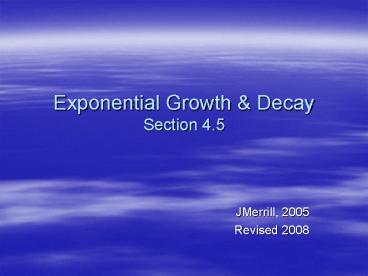Exponential Growth - PowerPoint PPT Presentation
1 / 22
Title:
Exponential Growth
Description:
Archaeologists find scrolls and claim that they are 2000 years old. ... the scrolls contain 78% of their original carbon-14. Could the scrolls be 2000 years old? ... – PowerPoint PPT presentation
Number of Views:1761
Avg rating:3.0/5.0
Title: Exponential Growth
1
Exponential Growth DecaySection 4.5
- JMerrill, 2005
- Revised 2008
2
Review
Is this okay?
NO
Arguments must be positive
3
Review
500e0.3x 600 e0.3x 1.2 ln 1.2 0.3x
x 0.608
4
Exponents and Logarithms
- How are exponents and logarithms related?
- They are inverses of each other
- Why is this important?
- Using inverses allow us to solve problems (we use
subtraction to solve addition problems division
to solve multiplication) - Many real-life scenarios are exponential in
nature and logarithms allow us to solve for the
unknown.
5
Examples Using Logarithmic Scales
- The Richter scale is used to determine the
intensity of an earthquake. - Measuring acidity using the pH scale, or
concentration of ions. - Carbon dating.
- Modeling population growth/decay--just to name a
few
6
Exponential Decay Model
- A(t) A0ekt
- A0 is the initial amount
- K is the growing/decay entity. If kgt0, the
entity is growing (an increasing function). If
klt0, the entity is decaying (a decreasing
function). - Looks like A(t) Pert? It works the same way.
7
Population Model
- In 1970, the US population was 203.3 million. In
2003, the population was 294 million. - Find the exponential growth model
- By which year will the US population reach 315
million?
8
Population Model
- t is the number of years after 1970.
- t0 represents 1970. t 33 represents 2003
- When t 33, A 294
- A(t) A0ekt
- 294 203.3ek(33)
9
Population Cont
What do you do when the exponent is a variable?
- 294 203.3ek(33)
So, k 0.011, which is exponential growth
The growth model is A(t) 203.3e0.011t
What does lne ?
10
Population Cont
- When will the population reach 315 million?
- A(t) 203.3e0.011t
- 315 203.3e0.011t
- You finish
- Did you get approximately 40?
- That means that in the year 2010 the population
will be approx. 315 million!
11
Carbon Dating
- The natural base, e, is used to estimate the ages
of artifacts. Plants and animals absorb
Carbon-14 from the atmosphere. When a plant or
animal dies, the amount of carbon-14 it contains
decays in such a way that exactly half of the
initial amount is present after 5,715 years.
12
Carbon Dating
- The function that models the decay of carbon-14,
where A0 is the initial amount of carbon-14, and
A(t) is the amount present t years after the
plant or animal dies, is
13
Carbon Dating Example
- Archaeologists find scrolls and claim that they
are 2000 years old. Tests indicate that the
scrolls contain 78 of their original carbon-14.
Could the scrolls be 2000 years old? - Using the same process as the last example, we
find k to be -0.00012. - Finding k is written out in the book on P449.
14
Carbon Dating Example
78 of the original amount
15
You Do
- A wooden chest is found and said to be from the
2nd century BCE. Tests on a sample of wood from
the chest reveal that it contains 92 of its
original carbon-14. Could the chest be from the
2nd century BCE? - Use the same k as the last example.
16
You do
17
Logistic Growth Model
- The spread of disease is exponential in nature.
However, there arent an infinite number of
people. Eventually, the disease has to level
off. Growth is always limited. A logistic
growth model is used in this type of situation - Y c is the horizontal asymptote. Thus c is the
limiting value of the function.
18
Modeling the Spread of the Flu
- The function below describes the number of
people, f(t), who have become ill with influenza
t weeks after its initial outbreak in a town with
a population of 30,000 people.
19
Modeling the Spread of the Flu
- How many people became ill with the flu when the
epidemic began? - How many people were ill by the end of the fourth
week? - What is the limiting size of f(t), the population
that become ill?
20
Modeling the Spread of the Flu
- How many people became ill with the flu when the
epidemic began? - In the beginning, t 0
21
Modeling the Spread of the Flu
- 2. How many people were ill by the end of the
fourth week?
22
Modeling the Spread of the Flu
- 3. What is the limiting size of f(t), the
population that become ill?
C represents the limiting size that f(t) can
obtain. There are only 30,000 people in the
town, therefore, the limiting size must be 30,000!































